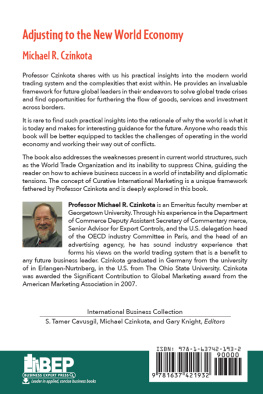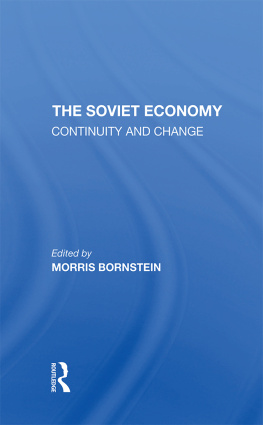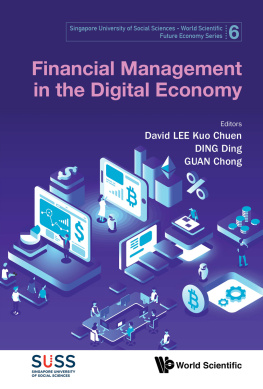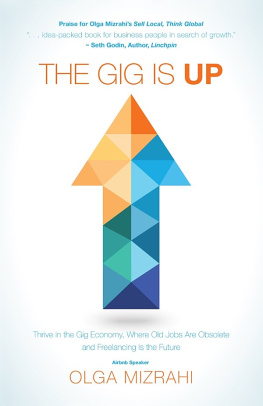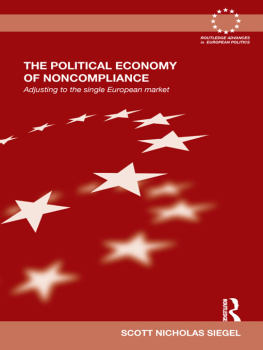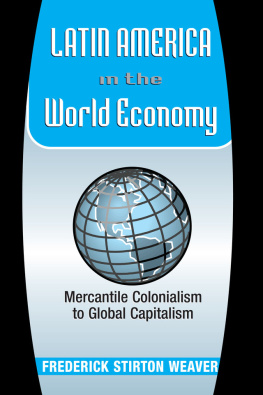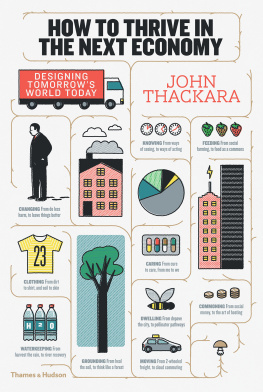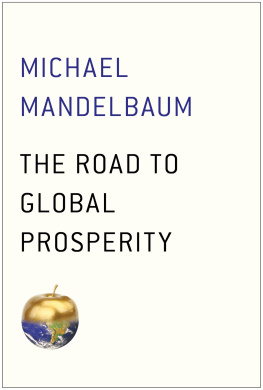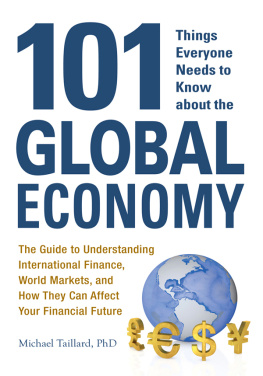Michael Czinkota - Adjusting to the New World Economy
Here you can read online Michael Czinkota - Adjusting to the New World Economy full text of the book (entire story) in english for free. Download pdf and epub, get meaning, cover and reviews about this ebook. year: 2022, publisher: Business Expert Press, genre: Science. Description of the work, (preface) as well as reviews are available. Best literature library LitArk.com created for fans of good reading and offers a wide selection of genres:
Romance novel
Science fiction
Adventure
Detective
Science
History
Home and family
Prose
Art
Politics
Computer
Non-fiction
Religion
Business
Children
Humor
Choose a favorite category and find really read worthwhile books. Enjoy immersion in the world of imagination, feel the emotions of the characters or learn something new for yourself, make an fascinating discovery.
- Book:Adjusting to the New World Economy
- Author:
- Publisher:Business Expert Press
- Genre:
- Year:2022
- Rating:5 / 5
- Favourites:Add to favourites
- Your mark:
- 100
- 1
- 2
- 3
- 4
- 5
Adjusting to the New World Economy: summary, description and annotation
We offer to read an annotation, description, summary or preface (depends on what the author of the book "Adjusting to the New World Economy" wrote himself). If you haven't found the necessary information about the book — write in the comments, we will try to find it.
Adjusting to the New World Economy — read online for free the complete book (whole text) full work
Below is the text of the book, divided by pages. System saving the place of the last page read, allows you to conveniently read the book "Adjusting to the New World Economy" online for free, without having to search again every time where you left off. Put a bookmark, and you can go to the page where you finished reading at any time.
Font size:
Interval:
Bookmark:

Adjusting to the New World Economy
Adjusting to the New World Economy
Michael R. Czinkota

Adjusting to the New World Economy
Copyright Business Expert Press, LLC, 2022.
Cover design by David Clark
Interior design by Exeter Premedia Services Private Ltd., Chennai, India
All rights reserved. No part of this publication may be reproduced, stored in a retrieval system, or transmitted in any form or by any meanselectronic, mechanical, photocopy, recording, or any other except for brief quotations, not to exceed 400 words, without the prior permission of the publisher.
First published in 2022 by
Business Expert Press, LLC
222 East 46th Street, New York, NY 10017
www.businessexpertpress.com
ISBN-13: 978-1-63742-193-2 (paperback)
ISBN-13: 978-1-63742-194-9 (e-book)
Business Expert Press International Business Collection
First edition: 2022
10 9 8 7 6 5 4 3 2 1
For Ilona, Margaret, and Thomas, thank you for our
many discussions that have led to new insights.
Description
Professor Czinkota shares with us his practical insights into the modern world trading system and the complexities that exist within. He provides an invaluable framework for future global leaders in their endeavors to solve global trade crises and find opportunities for furthering the flow of goods, services, and investment across borders.
It is rare to find such practical insights into the rationale of why the world is what it is today and makes for interesting guidance for the future. Anyone who reads this book will be better equipped to tackle the challenges of operating in the world economy and working their way out of conflicts.
The book also addresses the weaknesses present in current world structures, such as the World Trade Organization and its inability to suppress China, guiding the reader on how to achieve business success in a world of instability and diplomatic tensions. The concept of Curative International Marketing is a unique framework fathered by Professor Czinkota and is deeply explored in this book.
Keywords
international marketing; policy making; cultural interactions; curative marketing; technological relationships
Contents
During the second term of President Ronald Reagan, I was the United States Department of Commerce Assistant Secretary for Trade Administration. Subsequently, I became Under Secretary of Commerce. In those positions, I had responsibility for regulating international trade and overseeing the defense industrial base. Those positions also provided me with the privilege of working with Michael Czinkota on a daily basis.
I was indeed fortunate. He was a valued member of my management team, and I relied on him for advice and counsel. All government officials are not equal in their skill and acumen. Michael Czinkota was one who was exceptional. He was particularly valuable to have as a colleague. I appreciated his insights into the practical workings of international trade and the interconnectedness of the modern trading system.
Reflecting that knowledge, in this book he shares some of his understanding of how the system functions, what aspects of trade are organic and inherent in the process of trading, and what are the strengths and weaknesses of the structures that have been created to bring order to the system and how to market into that environment. As he illustrates, language, culture, technology, proximity, and many other factors play a role in the success or failure of efforts to sell in the international environment.
As a former colleague, I attest to the accuracy with which he describes the factors which made up our decisions. In this book, through vivid illustrations and anecdotes, he analyzes the key factors that determine success or failure of international enterprises. These factors can require governmental action or signal a need for the government to get out of the way and allow private entrepreneurs themselves create a solution to the problem.
All too often, we hear government officials talk as though the United States is self-sufficient to control its actions and policies independent of its trading partners or the state of the world economy. These same individuals talk as though supply chains and joint ventures can be altered to fit the preferences of the president or the policy goals of any administration without regard to the preferences of our trading partners, or adversaries for that matter. These same individuals seem to be ignorantor perhaps do not careabout how difficult it is to establish a reliable supply chain and how difficult it is to try to re-establish a supply chain or trade relationship if it is disrupted by government sanctions or changes in the technical parameters of export controls. Some, including both the current and former presidents, talk as though United States Government officials can increase exports with the snap of a finger, or bring industries back on shore when it suits the needs of our country.
Unfortunately, as one reads Dr. Czinkotas book, it will become clear that increasing exports or inducing companies to relocate in the continental United States involves a difficult and painstaking effort and does not always work out as planned, no matter how good the intentions. As he points out, over the past two years we have imposed tariffs on two-thirds of Chinese exports, and apparently what that has accomplished is to push the manufacturing of those products to other Asian countries, particularly Vietnam. It is a great aid program for Vietnam but not what we intended. The Chinese have suffered but so have we.
Dr. Czinkota demonstrates how interdependent and fluid world trade is. His data and insights give the reader an interesting and realistic perspective on international trade and marketing, a perspective that should help any policy maker or serious student of the subject understand just how complex trade actually is.
As I write this forward to Dr. Czinkotas book, the Congress is addressing the complexity of international trade through legislation aimed at increasing American competitiveness in the 21st century. In a just-passed Senate bill, tens of billions of dollars are being allocated to ensure, or so its sponsors claim, that the United States stays at the forefront of technology in semiconductor manufacturing, computer design, telecommunications, biotechnology, and all the other high technology fields that will determine which nation will be the future leader in these fields and which nation will be obliged to follow or to make copies of the technologies that others have pioneered. It was a shock to these Senators to find out that the Chinese company Huawei, which was heavily dependent on research and development carried out in the laboratories that served the Chinese Peoples Liberation Army, had become the preferred telecommunications equipment for countries around the world that are seeking to install new 5G telecommunications networks. They were competing with our best telecommunications manufacturers and winning.
The House has yet to act. But this situation reminds me of the panic that gripped Congress in the 1950s, when it was realized that the Soviets had launched Sputnik and were ahead of the United States in the space race. It seems that the Congress needs what it perceives to be a hostile challenge to jolt it into action. Today, China provides that incentive to develop a national strategy for technological competitiveness.
Font size:
Interval:
Bookmark:
Similar books «Adjusting to the New World Economy»
Look at similar books to Adjusting to the New World Economy. We have selected literature similar in name and meaning in the hope of providing readers with more options to find new, interesting, not yet read works.
Discussion, reviews of the book Adjusting to the New World Economy and just readers' own opinions. Leave your comments, write what you think about the work, its meaning or the main characters. Specify what exactly you liked and what you didn't like, and why you think so.

